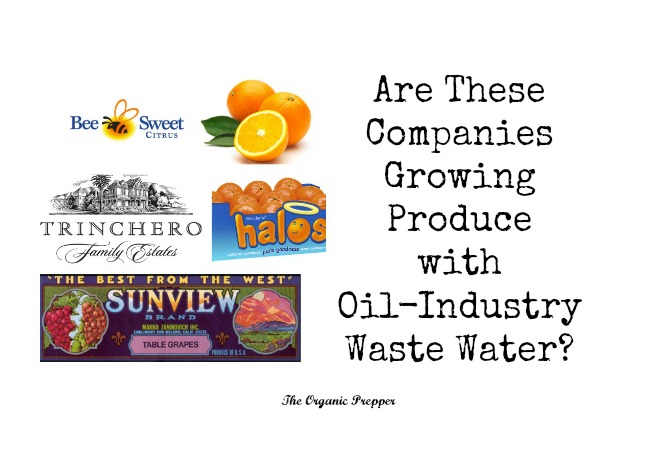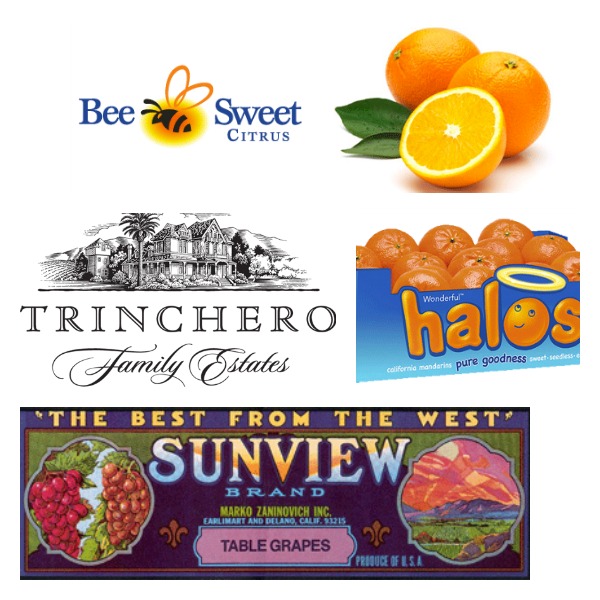If you're new here, you may want to subscribe to my RSS feed. Thanks for visiting!
By Daisy Luther
Some commercial farms in California came up with their own solution to the drought, and it’s not pretty. They decided to use recycled oil industry waste water to grow their produce. Chevron Oil Company treats 21 million gallons of waste water per day and sells it to farmers, who in turn use it to water 45,000 acres of crops in one of the country’s primary produce-growing areas.
It’s like something used in third world countries that we scorn for their unsafe practices:
In most developing countries wastewater treatment systems are hardly functioning or have a very low coverage, resulting in large scale water pollution and the use of very poor quality water for crop irrigation especially in the vicinity of urban centres. This can create significant risks to public health, particularly where crops are eaten raw.
But it’s happening right here.
Recycled irrigation water has been used to some degree for decades, but the testing has been limited to naturally occurring toxins, like salt and arsenic. Officially, no testing is done for the chemicals used in oil production. While farmers test crops for pests or diseases, they don’t test them for chemicals that may have absorbed through the roots from water. They figure that the water authorities are looking out for that. So basically, everyone expects that someone else does the testing, and no one does the testing. Nuts, citrus, and grapes may be highly contaminated but no one knows for sure.
Yummy, right?
This is what independent testing of the oil industry waste water showed
One environmental group took it upon themselves to test samples of the treated irrigation water. Water Defense, an advocacy group founded by actor Mark Ruffalo, discovered something very unsettling.
Mark Smith, the scientist who took samples for Water Defense, has been a consultant for the EPA on more than 50 oil spills. He took samples from areas of the canal that were publicly accessible and put them through comprehensive testing.
He found acetone and methylene chloride. These are solvents used to remove grease from equipment and soften crude oil, and said that the concentrations in the water were higher than he had seen at oil spill disaster sites. He also found C20 and C34, hydrocarbons found in oil.
Smith, the Water Defense scientist, has consulted for the Environmental Protection Agency and other government offices on more than 50 oil spills and spent two years studying the oil wastewater used for irrigation in Kern County.
He traveled the eight-mile Cawelo canal, taking samples of the water as it moved from Chevron’s oil fields through the irrigation canals to farmers’ fields. He said he gathered samples only from areas that were publicly accessible. He took samples from 10 points, collecting water from a number of depths at each site through a process that he said is more comprehensive than the sampling state and local authorities require.
The samples Smith collected contained acetone and methylene chloride, solvents used to degrease equipment or soften thick crude oil, at concentrations higher than he said he had seen at oil spill disaster sites. Methlyene chloride, by the way, is classified as a potential carcinogen. The water also contained C20 and C34, hydrocarbons found in oil, according to ALS Environmental, the lab that analyzed Smith’s samples.
Methylene chloride and acetone are used as solvents in many industrial settings. Methylene chloride is classified as a potential carcinogen.
“One sample of the recycled Cawelo irrigation water, for example, registered methylene chloride as high as 56 parts per billion. Smith said that was nearly four times the amount of methylene chloride registered when he tested oil-fouled river at the 2013 ExxonMobil tar sands pipeline spill in Mayflower, Ark. That spill was declared a federal disaster, spurred evacuations and resulted in a $2.7-million fine for the company.
Chevron told The Times it does not use acetone or methylene chloride in its oil extraction process. The company would not disclose the fluids used in drilling or well maintenance.”
But don’t worry. It’s perfectly safe.
The water district is unconcerned. One board member (who grows pistachios and citrus, by the way) feels that the water testing being done is accurate.
Mark Smith, a board member of the Cawelo Water District who grows pistachios and citrus using treated water from Chevron, said he had “never heard a word” about contamination from the oil production process and is satisfied that the water testing is adequate. Glenn Fankhauser, assistant director of the Kern County Department of Agriculture and Measurement Standards, concurs. “As long as they’re treating the water to the point where it’s allowed by whatever agency governs the quality of water, I think it would be OK.”
Note the blithe unconcern shown by those who are, of course, profiting greatly from the use of toxic water to irrigate food crops.
The thing that blows my mind is how small family farms are being regulated out of business to keep us “safe” but this stuff goes on and no one in “authority” bats an eyelash. But somehow, we who are concerned about the fact that those with lots of money are not regulated are the kooky conspiracy nuts. As I’ve written about at length, with regard to something as important as water, you must take the responsibility for safety upon yourself.
Here is a list of companies whose farms receive oil industry wastewater
So, as it turns out, those cute little Halo oranges aren’t really very angelic.
An environmental group called Food and Water Watch received a list from the district of the names and addresses of companies that use its water.
Look for these labels in the grocery store, and avoid them until/unless they are proven safe, because, as per a report by Mother Jones, they’re most likely grown using oil industry wastewater.
- Sunview (table grapes, raisins, persimmons, and prune plums)
- Wonderful Citrus (Halos and Cuties – this company also owns Fiji Water, POM Wonderful, and the world’s largest pistachio and almond growing operation)
- Trinchero Family Estates (wine)
- Bee Sweet Citrus (mandarins, oranges, and lemons)
It all comes back to the same refrain: if you don’t grow it yourself or know the grower personally, you really can’t trust it. We must go back to the days when food was sourced locally so that we can be our own watchdogs.
Sources:


















So, is Mark Smith the scientist who tested the water or the board member who grows pistachios?
According to the online article, Are your organic foods being doused in fracking chemicals? Probably so, if they come from California, http://www.naturalnews.com/050624_fracking_chemicals_food_crops_waste_water.html, the name of the scientist who did the water testing was Scott Smith, not Mark Smith who evidently is on the Cawelo District Water Board.
You failed to mention that Organic farms are being watered with the same water.
They did say more than once that the water was used for some organic farms too. Please read the article again 🙂 Using a contaminated water at an organic farm should disqualify it from being “organic” for quite a few years. Then there’s the matter of rain water being contaminated. Rain is not something a farmer can protect against. What is causing the contaminated rain? That should be addressed by a competent and reasonable fair agency that follows well reasoned fair law based on well reasoned and fair guidelines advocating reasonable procedures that accomplish the purpose of clean rain water. People who are responsible for an act which leads to contamination of rain water should contribute to the remedy. If a contamination exists which causes contamination of rainwater it needs to be cleaned up or contained so that it does not contaminate rain water or public water any more and there may need to be public money used to do it. Irrigation can use water that has been purified. Rainwater contamination has to be dealt with at the source of contamination. Our health will suffer if we don’t have clean water to grow our food. Giant greenhouses to prevent use of unpurified rainwater may not be the answer. We have to protect our rain and water and food supply for our health.
Grow your own! True Food transparency is the answer and this answer lies fallow in your yard or your farm. Food is money! Let it originate from you! Greenhouses Are the Answer and The Future. #foodtransparency #growyourown #greenhouses
#thermagro @thermagro
You’re absolutely right, Eric 🙂
Slightly hysterical (contamination != pollution), but an issue with talking about (given the potential for uptake at levels that may affect us). Glad to see that someone is at least testing the water in the canals.
Hmm…hysterical?
According to the dictionary, the words contamination and pollution are interchangeable.
pol·lu·tion
pəˈlo͞oSH(ə)n/
noun
the presence in or introduction into the environment of a substance or thing that has harmful or poisonous effects.
“the level of pollution in the air is rising”
synonyms: contamination, adulteration, impurity, dirt, filth, toxins
Tomato, tomahto I suppose.
Hi Daisy… In the water industry, the words are separated (two words, two meanings), i.e., contamination is detectable; pollution is dangerous. I see your main point, but the wrong words obscure the big problem: nobody knows how dangerous this stuff is, and agencies (or industry) had better jump on it.
Shouting “grow local organic” as the solution to this problem does not resolve it. Many people are affected by this; they need to know what’s up.
I’d like to see some reports on this.
Thanks for the clarification, David. 🙂 I agree that growing locally isn’t the only answer. For me, these products actually ARE fairly local. I also don’t think that there is any type of policy in place that would prohibit an organic farm from using the water from a municipal company for irrigating, because until this came to light, no one considered it. The dilemma there would be more ethical than legal.
What I’d like to see is whether these chemicals are present in the fruit that has been grown this way. At least once a week, I say to myself, “I wish a had a lab!”
From the Natural News link, “”When I talk to growers, and they smell the oil field crap in that water…”
How bout that. For years now, off and on, when I ate a store bought orange I thought it tasted a bit like gasoline. I thought it was just me. Maybe it isn’t just me.
I seemed to remember that in the 1970’s oranges tasted sweet and I enjoyed them. I had some pretty good wild grown ones in the 1990’s, too. These days though, I Never think the store bought oranges I get are something I would call “sweet tasting”, again, maybe it isn’t just me.
“they smell the oil field crap in that water” – wow, just, wow.
Great! Just fantastic, I am a huge consumer of pistachios and pom juice! This is beyond disgusting! I too would like to see some reports! Local growing can only go so far. It takes years for some things to start producing and some things just won’t grow everywhere! So these two things will now be off my list! 🙁
We should be able to sue them!!!!
This is outrageous! I had no idea about this and was purchasing these produce. We should be abel to sue our government and the FDA for protecting
These corporations. Unbelievable
After reading about this on FB, I
Immediately returned my bag of Cutis back to Fred Meyer and told them why. And why I will not purchase any produce grown in Calif until I see that this process has STOPPED
and they don’t use tap water which is proven to have fluoride, chlorine, and all sorts of prescription medication runoff in it to irrigate all crops regardless if it’s labeled organic or not. this is why I agree, we must have local growing and put an end to big food worldwide trading. I just ate my first bite of a big seedless watermelon and it’s making me spit because I know there is so much poison in it because it’s mostly just water. It came from Florida.
Long ago I was a chemical engineer and there are two different water standards from the EPA (they do not make sense at all). One standard for waste water and the other for drinking water. Theoretically if the specs were rational and the water meets drinking water standards it should be safe for irrigation. Waste water depending on the contaminant has limits either lower or higher than drinking water. For instance in my day you could have 100 times more phenol in drinking water than waste water. Do the samples meet the current waste water standard or is Chevron violating the standards? Waste water is deemed safe by the government to put in the river, ocean, environment.
All that being said I think the food system is in crisis with the nutritional value plummeting and the introduction of foreign substances skyrocketing. Without doing long term studies on each contaminant and I include antibiotics, pollution, hormones, pesticides, fertilizers, etc there is no way to determine the effects that we may encounter in humans.